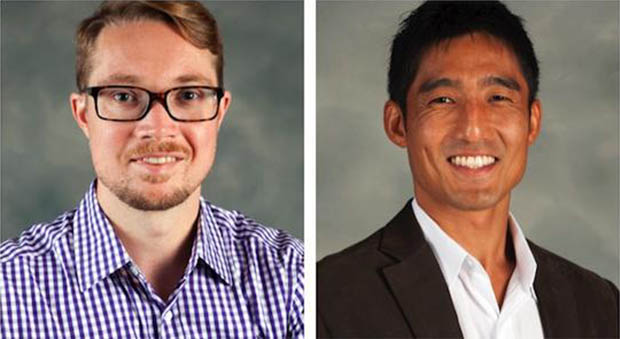

University of Hawaiʻi at Mānoa John A. Burns School of Medicine Associate Professors Kazuma Nakagawa and Matthew Koenig received awards from the American Heart Association (AHA) Western States Affiliate. Koenig won the Quality and Systems Improvement Award, and Nakagawa was named Physician Volunteer of the Year. Both were selected from volunteers across a 10-state region for their outstanding work.
Matthew Koenig: Improving patient care
Koenig, who serves as chair of the Hawaiʻi Stroke Coalition, was honored for his outstanding contributions to improving the quality of patient care throughout state. Through his leadership, stroke acute care hospitals through Hawaiʻi are assessing the records of more than 30,000 stroke patients to identify opportunities to improve the care provided to them. Koenig has encouraged Hawaiʻi’s acute stroke care hospitals and Emergency Medical Service agencies to work together to identify ways to reduce the time to treatment and improve the quality of care provided to stroke patients following medically-recognized best practices.
“The goal of Hawaiʻi Stroke Coalition is to make sure we can look people in the eye and say we are working together as a state to make sure that if you call 9-1-1 for stroke symptoms, you will receive the highest possible quality of stroke care. That means educating people to recognize stroke symptoms, working with paramedics to identify stroke and transport patients only to hospitals that are capable of providing high quality stroke care and calling ahead to the receiving hospital to speed up stroke treatment” he said.
Kazuma Nakagawa: Outstanding contributions in medical and research fields
Combining his medical practice with his research interests, Nakagawa is investigating racial-ethnic disparities in risk factors and outcomes in Hawaiʻi stroke patients, particularly among Native Hawaiians and other Pacific Islanders who are having strokes 10 years younger than other racial-ethnic groups.
He also serves on the Hawaiʻi State Stroke Coalition that is working to improve stroke patient care and outcomes statewide. As part of that effort, he serves on the American Heart Association’s Hawaiʻi Division Stroke Communications Plan Task Force which is working to address issues with public response to stroke symptoms. He also participates in the AHA Hawaiʻi Division’s work to reach multicultural audiences with disease prevention education messaging, and supports the AHA’s fund-raising goals by serving as a spokesperson to raise public awareness about the AHA’s vital work to improve cardiovascular health in the community.
“Stroke is a severely disabling condition that could take away someone’s quality of life permanently,” said Nakagawa. “Fortunately, up to 80 percent of the stroke can be prevented, and the disabling symptoms can be reversed if an effective treatment is provided in a timely manner. That is why I continue to envision and strive to make our community a healthier place, free of stroke and heart disease,” Nakagawa said.
Read more about the honorees at the JABSOM website.
—By Tina Shelton

